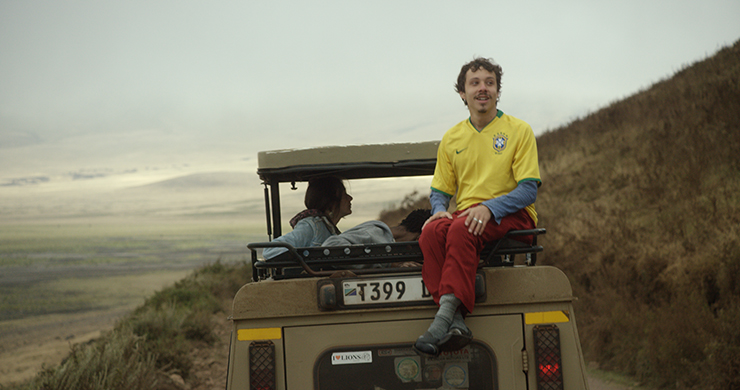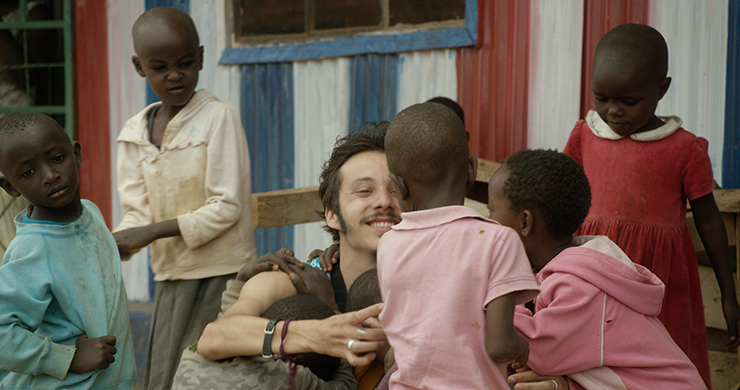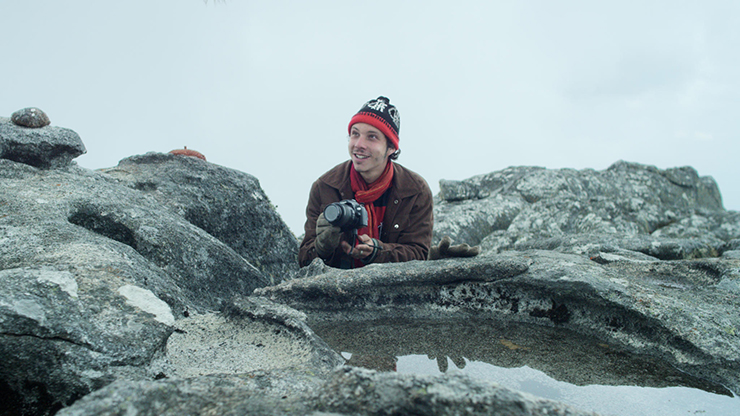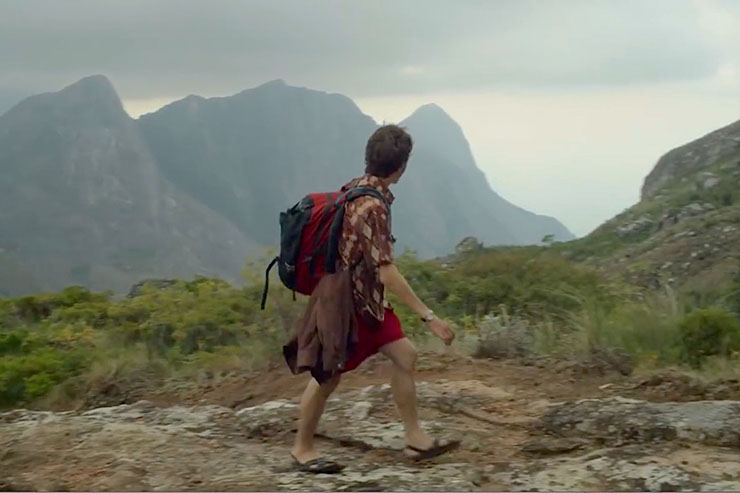
Caroline Abras, João Pedro Zappa in "Gabriel and the Mountain," now showing at Miami Beach Cinematheque.
Ruben Rosario
He sticks out like a sore thumb, his thin frame wrapped in vibrant fabrics as he runs around the streets of a remote Kenyan village and interacts with as many people as he possibly can. But Gabriel Buchmann is no mere fish out of water, and “Gabriel and the Mountain” is not your average Africa travelogue. It follows the young Brazilian as he makes his way across the Dark Continent during the summer of 2009 ... until an ill-fated trek to the titular peak gets the best of the charismatic visitor.
It's no spoiler to say Buchmann's body was found on Malawi's Mount Mulanje. The serene opening shot that opens writer-director Fellipe Barbosa's sophomore feature, based on his childhood friend's travels, shows field workers coming upon his cadaver. But the film doesn't want viewers to dwell on such sad details. It would much rather sit back and capture those informal exchanges that Buchmann favored. In an early scene, for instance, members of the Maasai tribe in Kenya ask Buchmann (João Pedro Zappa) to sing a song from his home country, and vice versa. These laid-back powwows might initially feel shapeless, but they belie a neatly structured narrative that gradually immerses the viewer in the wanderings of this “mzungu,” which is the Bantu term to refer to people of European descent but which actually means “someone who roams around.” Quite fitting, in this case.

João Pedro Zappa
Buchmann wanders, ostensibly to do research on poverty in Africa, but as the film unfolds, it becomes clear there are other motives fueling his impulse to experience cultures different from his own. Barbosa wisely opts not to spell things out for easy consumption, and instead let details drop the way they would in real life, as if in passing. We learn Buchmann, endlessly curious and blessed with the ability to make friends everywhere he goes, is wrapping up a yearlong trip around the world before he begins doctoral studies in public policy at UCLA. There's a childlike sense of wonder to Buchmann, so it almost comes as a surprise that he has a girlfriend.
When Cristina (Caroline Abras) meets Buchmann to join him for part of his journey, Barbosa turns his attention to the couple, who met in Brazil just before he set out on his globe-trotting trip. In an extended scene that shows the lovebirds bickering in a bus, their differing worldviews are laid bare: she calls him out on his plans to study in a country for which he has ambivalent feelings, and he calls her out on what he sees as the ineffectual nature of her theoretical research, as opposed to his more hands-on approach.
The argument, which is reminiscent of Richard Linklater's “Before” trilogy, is juxtaposed with equally telling moments that convey what feels like a sturdy romantic connection, such as when he recites Mario Quintana's poetry to her, with Victoria Falls as their backdrop, or when they sing “Bohemian Rhapsody” to each other during a picturesque candlelight dinner at dusk. Cultural differences come up during a conversation between the couple and a schoolteacher in Zambia, where they learn that unmarried couples are a big no-no in that region.

João Pedro Zappa
That schoolteacher plays himself, along with most of the African residents Buchmann came into contact with during his trip, whether it's the tour guide who took him to the top of Mount Kilimanjaro or the truck driver who gave him a place to stay as the foreigner made his way to Malawi. It's an inspired move that imbues the film with a lived-in immediacy.
The filmmaker's lyrical naturalism prevents “Gabriel and the Mountain” from feeling dry or remote. To call it a docudrama feels reductive; it does this captivating true-life tale a disservice. (Kudos to cinematographer Pedro Sotero's unfussy widescreen lensing.) Barbosa acclimates viewers to the sedate rhythms of the backpacker's “non-touristic and sustainable” expedition. His lovingly rendered portrait resists the urge to “punch up” the narrative or to pick up the pace, and is the stronger work because of it. At least for most of its running time.
So resolute is Barbosa on his refusal to manufacture incident that, ironically enough, Buchmann's climb up Mount Mulanje feels rather anticlimactic. He goes up the mountain, ditches his guide and becomes lost. End of story. It's an admirable, no-frills approach that does have the effect of making the film's final 20 minutes feel too drawn out, even with the intriguing tidbit that Mount Mulanje reportedly inspired J.R.R. Tolkien prior to writing “The Lord of the Rings.” But despite the overlength, this reviewer was too invested in this uplifting chronicle to mind all that much.

João Pedro Zappa
With “Gabriel and the Mountain,” a big winner at the 2017 Cannes Film Festival Critics' Week, Barbosa has crafted a vividly transporting travelogue, with shades of “Into the Wild” and “The Motorcycle Diaries,” that doubles as a perceptive character study, as well as a touching yet unsentimental love story. It invites us to live vicariously through someone who embraced life with eyes wide open.
“Gabriel and the Mountain” is now showing at the Miami Beach Cinematheque. For more information, go to www.mbcinema.com/tickets.




